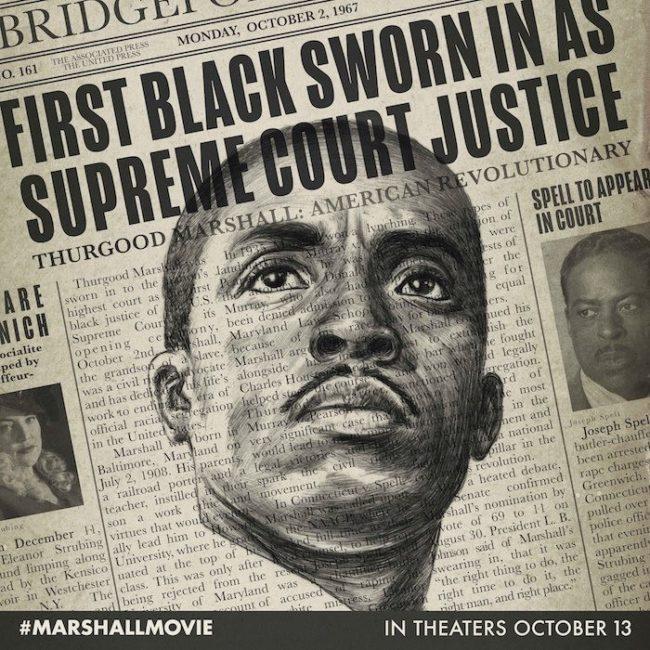
by John Sullivan
“Marshall” takes typical courtroom drama and injects it with a vibrant passion, bringing the story vividly to life. Much like many of the superhero origin stories hitting the big screen recently, “Marshall” depicts a young Thurgood Marshall, the first black Supreme Court justice, building up the mystique and prestige that defined his life. Still a young trial lawyer for the NAACP, Marshall is faced with a career-defining case as the fate of an African-American chauffeur at the mercy of a southern and very white court system is placed in his hands.
Marshall is played by Chadwick Boseman, who is known for playing strong, independent characters as Jackie Robinson in “42” and Black Panther in “Captain America: Civil War.” These characters proudly stand for their rights in the face of social and physical pressure. Naturally, he excels in the role of Thurgood Marshall, who fits comfortably in his current repertoire.
Marshall is the smartest guy in the room and he knows it. The challenge comes from the blatant racial bias that the judge and prosecution have against him which manifests itself in the many obstacles they throw at him that would prove insurmountable to any other lawyer. He is forced to work with unexpected allies, the primary one being his costar.
Boseman shares the screen with Sam Friedman (Josh Gad), a young Jewish lawyer. Friedman is not a criminal lawyer but somehow gets roped into this case with Marshall and must quickly learn not only the ins and outs of criminal law but also how to remain strong in the face of heavy political and social pressure. He proves to be a vital element of Marshall’s plan and grows to become a potent criminal lawyer in his own right.
Although Gad seems to be trying to struggle out of a goofy sidekick typecast, the interplay between him and Boseman is enrapturing. Their respective characters act as foils for one another as Marshall teaches Friedman to overcome his cowardice in order to stand up for what he believes in, and Friedman checks Marshall’s elephant-sized ego and helps him to remember the little things instead of just focusing on the big picture.
Unfortunately, Boseman and Gad are the only main actors who really bring their characters into three-dimensional space. The other characters in the courtroom often come off as flat and predictable and don’t really add anything unique to the dialogue about race that the movie is trying to promote. Although the courtroom scenes were engaging and fun to watch, it was only due to Marshall and Friedman finding unique solutions in their attempts to outsmart a biased courtroom. The prosecution, judge and witnesses all played their roles as expected and didn’t really challenge the themes of the movie in ways that they had the potential to.
Another notable performance came out of the role of the Chauffeur whom the case revolves around: Joseph Spell. Played by Sterling K. Brown, this character conveys some strong and important emotions with a select few opportunities to do so. It was an unexpected pleasure to watch him overcome obstacles in the way of Marshall and Friedman, challenging their relationship in the process.
Ultimately, “Marshall” is a satisfying origin story that adds some unique perspective on the issues of prejudice and race, perspective that is important to have in the current political landscape. Although a bulk of the supporting cast gave performances that fit into the predictable formula of a movie about race relations, Boseman with the support of Gad helped push the film back into an entertaining and thought provoking place. They did an excellent job of fleshing out the flaws in their respective characters, and their synergy on screen elevated both of their performances.








